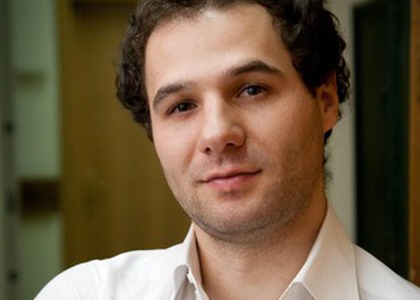> Interviews

Interview with Andrei Fermeșanu, interim manager of the Romanian National Opera in Iași
Within the "Bucharest Opera Festival - All Puccini edition", the Romanian National Opera of Iași proposes on Tuesday, June 11th, the performance "Boema". Andrei Fermeșanu, interim manager of the institution, talked to our colleague Ariadna Ene-Iliescu about the festival and the activity of the Iași Opera:
What does it mean for the Romanian National Opera of Iasi to constantly participate in the Bucharest Opera Festival, now in its third edition?
It is an opportunity to present to the Bucharest audience the most valuable productions that the Romanian National Opera of Iasi has in its repertoire. We are at this third edition with Giacomo Puccini's "La Boheme", after having previously, in the first two editions, presented two masterpieces directed by Andrei Șerban to the opera-loving public in Bucharest: "The Merry Indies" and Lehár's operetta "The Merry Widow".
So, it is an opportunity, as I said, to make us even more visible at national level and, at the same time, a proof that, overcoming ambitions, local pride, we manage together to show a certain interpretative force of opera in Romania.
As you said, during this edition of the festival celebrating Puccini's centenary year, the opera from Iasi will present the performance "Boema", on June 11th. What would you say are the strengths of this production?
It is a production that, although it is now 10 years old, in June, since it was staged in Iasi, it is still selling out, a much-loved production, much appreciated thanks to the staging - scenography and direction. The direction, by the way, is by the renowned Niky Wolcz - a world-renowned personality of the opera stage; the set - Helmut Stürmer; the costumes - Lia Manțoc. And, of course, a well-known cast, with a national scope and I refer here to Mimi - Ana Maria Donose, Rodolfo - Florin Guzgă, Marcello - Alexandru Constantin, Schaunard - Andrei Yvan, Colline - Teodor Busnea, Musetta - Cristina Grigoras and so on. Again, as a coincidence, the world premiere of "La Boheme" took place in 1896, in Turin - it is the very year when the National Theatre of Iași was finished, a building that currently hosts the performances of two important institutions - the National Theatre of Iași and the Romanian National Opera of Iași.
So, I think the Bucharest audience should expect a very good quality show, with an extremely generous artistic resource. We are travelling to Bucharest with 223 artists big and small - from the children's choir, from the large choir, technical, orchestra, ballet - all under the baton of Maestro David Crescenzi, so the premises for success are very strong.
How would you describe the Iași Opera's collaboration with conductor David Crescenzi?
It's a decades-long collaboration. Maestro Crescenzi is an authority, but he is also a charismatic person, able to homogenize the ensembles - because we all know that the syncretism of the opera performance requires a joint artistic effort. He has this ability to bring everyone together to focus their creative energies to give the best performance of the day. It's a nationally verified fact. Every time he appears on a poster, it arouses interest and that is surely due to a professional yearning.
What do you think is the socio-cultural importance of such a festival that brings together national and even international opera companies?
It's a very special importance. Certainly, beyond the logistical difficulties of travelling from different parts of the country to the capital, it means a united understanding of the importance of giving the public large-scale cumulative projects, all the more so as this year we are celebrating the personality of the great Puccini. I think it is an example of good practice that local pride can be overcome and here is a festival that has been professionally completed and that I believe can stand alongside the major festivals of its kind in Europe.
At the end of the season, the Opera of Iași continues the celebration of the Puccini Year.
On the 29th and 30th of June we close this season with a new production, also Puccini's last opera, "Turandot". In fact, at this moment, we are in the middle of a creative process; we are rehearsing intensively, first of all in the direction. Musically, we had the opportunity last season to present it to the public in concert opera format so as to familiarise all the opera's artistic departments with this challenging score. So, we are stopping for a few days in the run-up to the Bucharest Opera Festival with the creation of "Turandot" and changing only the title of the opera, not the composer, and returning home we will continue working on this "Turandot", which we hope will be a real success because in the 68-year history of our institution it is the first time that we will be able to and see this performance with all its constituent elements. Finally, I can assure you that at least up to this point we have all the elements of a home-made success. But, at the same time, a very important title that enters the repertoire of the Iași Opera and that, I repeat, was missing.
Translated by Vlad-Cristian Dinu,
University of Bucharest, Faculty of Foreign Languages and Literatures, MTTLC, year I
Corrected by Silvia Petrescu














